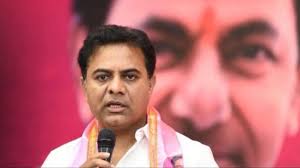
K.T. Rama Rao, widely known as KTR, the Working President of the Telangana Rashtra Samithi (TRS) and the Minister for Municipal Administration and Urban Development in Telangana, recently found himself at the center of a controversy over his remarks on free bus travel for women. KTR’s comments, perceived by many as dismissive, sparked widespread criticism and led to heated debates across various platforms, particularly on social media. The backlash eventually prompted him to issue a public apology, but the incident has brought to light several underlying issues related to gender, governance, and the politics of populism. This article explores the controversy, the public reaction, and the broader implications of KTR’s remarks and subsequent apology.
Table of Contents
The Controversial Remarks: What Was Said?
The controversy began during a public event where KTR was addressing a gathering on various government initiatives and policies. In response to a question about the possibility of introducing free bus travel for women in Telangana, KTR reportedly made a remark that was interpreted by many as trivializing the issue. While the exact wording of his statement varied in different reports, the essence was that such a policy was not feasible or necessary, and that the government was focusing on other priorities.
KTR’s comments were quickly picked up by the media and shared widely on social media platforms. Critics argued that his remarks were dismissive of the challenges faced by women, particularly those from economically disadvantaged backgrounds, for whom free bus travel could be a significant benefit. The backlash was swift, with many accusing KTR of being out of touch with the needs of the people, especially women.
Public Reaction: Outrage and Debate
The public reaction to KTR’s comments was overwhelmingly negative, with many people expressing their anger and disappointment. Women’s rights groups, opposition parties, and social activists were particularly vocal, accusing KTR of being insensitive to gender issues. They pointed out that free bus travel for women had been successfully implemented in several other states, including Delhi and Tamil Nadu, and had proven to be a valuable policy for empowering women and improving their access to education, employment, and other opportunities.
Social media was abuzz with criticism, with hashtags calling for accountability and respect for women’s issues trending on platforms like Twitter. Memes, videos, and posts criticizing KTR’s remarks flooded social media, with many questioning whether the government was truly committed to gender equality and women’s welfare.
Some political analysts also weighed in, suggesting that KTR’s comments could hurt the TRS’s image, especially among women voters, who constitute a significant portion of the electorate. The controversy also provided ammunition for opposition parties, who seized the opportunity to criticize the ruling party and highlight what they perceived as its failures in addressing gender issues.
KTR’s Apology: A Step Towards Damage Control
In response to the mounting criticism, KTR took to social media to issue a public apology. In his statement, he expressed regret for his remarks, stating that they were not intended to offend or diminish the importance of women’s issues. He acknowledged the concerns raised by the public and affirmed his commitment to working towards the welfare and empowerment of women in Telangana.
KTR’s apology was seen as a necessary step to mitigate the damage caused by the controversy. However, reactions to the apology were mixed. While some appreciated his willingness to acknowledge his mistake and apologize, others felt that the apology was insufficient and questioned the sincerity of his commitment to gender equality.
Several commentators noted that while the apology was a positive move, it did not address the broader concerns about the lack of gender-sensitive policies in the state. They argued that the incident highlighted the need for more substantive action on women’s issues, rather than just rhetoric or symbolic gestures.
The Politics of Populism: Free Bus Travel as a Policy
The controversy surrounding KTR’s remarks has also sparked a broader debate about the politics of populism and the role of welfare schemes in governance. Free bus travel for women has been a popular policy in several states across India, where it is seen as a way to address gender disparities and provide tangible benefits to women, particularly those from lower-income backgrounds.
In Delhi, for example, the Aam Aadmi Party (AAP) introduced free bus travel for women as part of its broader strategy to improve public services and increase its appeal to women voters. The policy was widely praised for its positive impact on women’s mobility, safety, and access to opportunities. Similarly, in Tamil Nadu, the DMK government implemented free bus travel for women as a key election promise, further highlighting the growing importance of gender-sensitive policies in Indian politics.
Broader Implications: Gender, Governance, and Public Perception
The incident involving KTR’s remarks and the subsequent apology has broader implications for gender politics, governance, and public perception. It highlights the challenges that political leaders face in balancing public expectations with policy priorities, especially in a diverse and complex society like India.
For KTR and the TRS, the controversy is a reminder of the importance of gender-sensitive governance and the need to be mindful of public sentiments, particularly on issues related to women’s welfare. The backlash against KTR’s comments underscores the growing awareness and activism around gender issues in India, as well as the increasing expectations that political leaders will take these issues seriously.
Conclusion
KTR’s controversial remarks on free bus travel for women and his subsequent apology have sparked a significant public debate in Telangana and beyond. The incident has highlighted the complexities of gender politics and the challenges of governance in addressing the diverse needs of the population. While KTR’s apology may have helped to quell some of the immediate criticism, the controversy has left a lasting impact on public perception and has raised important questions about the state government’s commitment to gender-sensitive policies.










